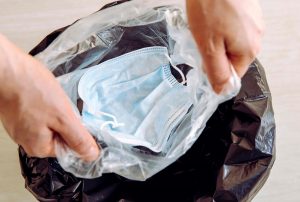Businesses across the country are once again opening their doors, or windows, to consumers thoughtfully, while supporting the economy at the same time. As an essential service, RTS has been operating as close to full capacity as possible and we are often asked how other companies and organizations have been or plan to deal with waste during these unprecedented times. To give some clarity to these questions, we spoke with RTS COO, Adam Pasquale to understand how waste should be processed and how recycling properly is more important than ever.
With so many other priorities for reopening the economy, where should businesses place recycling and waste diversion on the list?
Sanitation is a matter of public health, and sanitation workers are frontline and essential in the fight against COVID-19. As businesses reopen with an increased focus on more frequent and thorough workspace cleanings and overall hygiene, the way in which they dispose of waste and recycling will be critical. Unhygienic environments are known to enable the spread of disease, so regular collections are vital.
Helping divert waste away from landfills and into recycle bins is also critical. Simply put, people working from home are generating more trash, and in general tend not to recycle as well as when they are in offices. Office workers can help reverse that recycling trend by ensuring everything is sorted and collected correctly.
 Should my business treat waste any differently?
Should my business treat waste any differently?
For the most part, disposal of waste can be treated the same as before the crisis. However, businesses may want to consider more frequent pickups and on-demand collections in order to minimize the amount of materials present in the office at any given time. Materials always carry the possibility of infection and allowing them to build up in enclosed spaces may increase the potential risks for your employees.
How should businesses deal with PPE and potentially contaminated waste?
For now, if specific waste is known to have been exposed to COVID-19, it should be disposed of in normal trash bags. However, the bags must be securely sealed for the protection of both staff and sanitation workers. In the coming weeks, the Center for Disease Control (CDC) and other industry groups may revise this guidance and suggest that COVID-infected waste be disposed of in a different manner. Please check back here as we will update this Q&A accordingly.
Will collections be affected?
Some haulers have reduced service due to the crisis, but for the most part businesses themselves have reduced waste management requirements. Therefore, workers and hauling companies stand ready to resume business as usual. RTS is at full capacity and ready to scale back to normal and deal with any increases.
How will workers/haulers be protected?
Companies like RTS prioritize the safety of our customers and workers above all else. We are diligently ensuring that workers have adequate protective equipment (PPE), including masks and gloves, as well as providing comprehensive advice and guidelines on how to minimize the chance of spreading the virus.
How will my staff be protected?
Staff who interact directly with haulers, such as facility managers, should adhere to social distancing norms in line with guidance from the CDC. As an additional precaution, haulers should be masked at all times. We recommend that facilities workers do the same.
Twitter has announced that working from home will be made a permanent option for staff, and many companies are likely to follow suit, what does this mean for the waste generated by businesses/individuals?
Working from home means that more waste and recycling is generated at home, and less in offices and other workplaces. This poses challenges for recycling since residents tend to be less careful with recycling than office workers.
If you are working from home, you can help the environment by learning about proper recycling practices and techniques (which often are more complicated than we think). For their part, hauling companies remain prepared to serve both businesses and residential areas.
Want more information on how RTS can help your business adapt to the new normal and deal with your waste effectively?
Alternatively, learn more about recycling and sustainability in general on the RTS blog.




